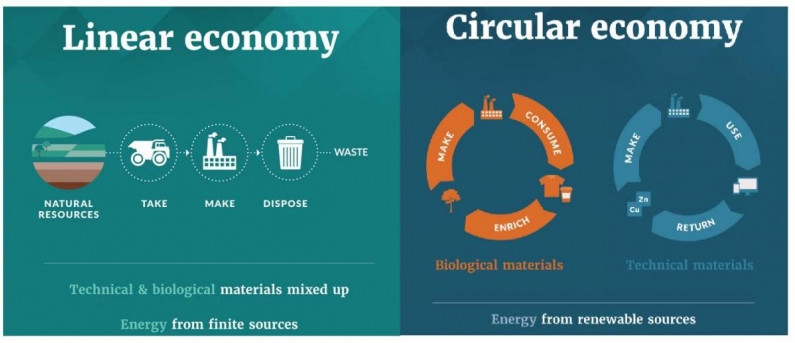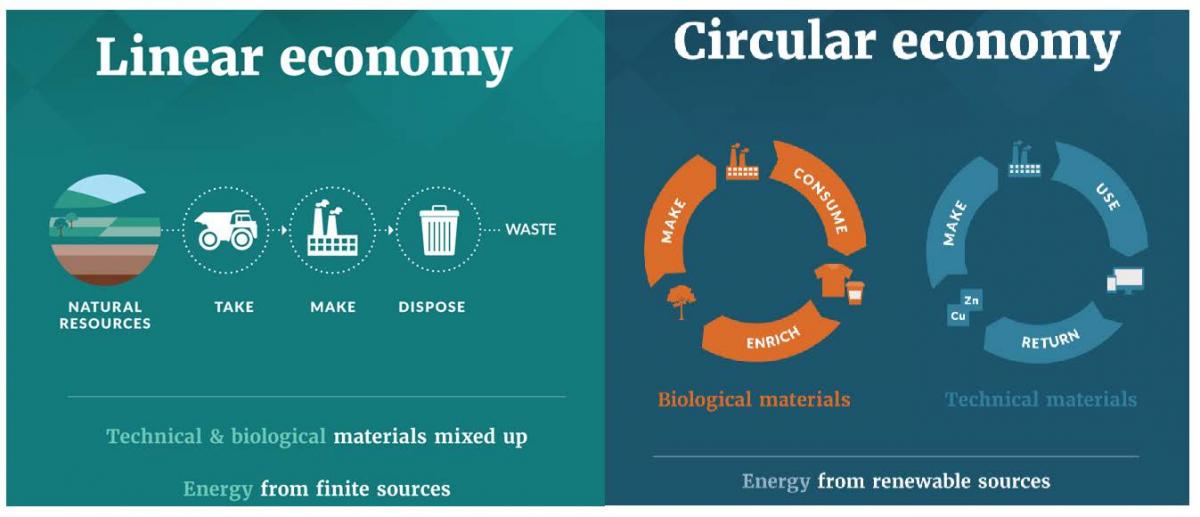Government waste work programme
What we are doing to reduce waste across Aotearoa New Zealand.
Reducing waste will help with our transition from a linear economy with its take, make, dispose approach to a low-emissions circular economy.
What we are doing to reduce waste across Aotearoa New Zealand.
Reducing waste will help with our transition from a linear economy with its take, make, dispose approach to a low-emissions circular economy.
A low-emissions ciricular economy involves:


To reduce the amount of waste Aotearoa New Zealand produces, we are:
We recently launched our new waste strategy to set Aotearoa New Zealand's direction on waste for the next three decades
Find out more about the strategy
The new strategy is part of Objective 1: Building the foundations for a transformed waste system in our Waste reduction work programme.
We have also released Aotearoa New Zealand's first Emissions Reduction Plan.
The plan includes:
Research and development
Innovation
Community projects
Infrastructure
Public information
Te ao Māori initiatives
Remediating contaminated sites.
We are supporting projects that increase the reuse, recovery and recycling of materials through Te Pūtea Whakamauru Para - the Waste Minimisation Fund.
The fund invests in a wide-range of projects from multi-million-dollar infrastructure investments to smaller hapū/community-centred projects.
See more on the Waste Minimisation Fund
Over the next two years, we are funding a range of resource recovery infrastructure projects through the COVID-19 Response and Recovery Fund.
See more on the COVID-19 Response and Recovery Fund
We are investing $50 million over four years in projects that find ways to use less plastic and make what we do use reusable or recyclable through the Plastics Innovation Fund. The fund opened for expressions of interest for its second funding round on 1 November 2022. The focus of this funding round is reducing soft plastic waste.
See more on the Plastics Innovation Fund
We are looking to invest up to $8.3 million in behaviour change programmes that reduce food waste.
The programmes will aim to reduce food waste in three settings: households; Māori-led settings (such as marae, kōhango reo, kura kaupapa, papakāinga); and businesses.
We sought expressions of interest in funding from organisations from 14 November to 4 December 2022.
Find out more about the funding and types of programmes we want to invest in
We fund regional councils and unitary authorities to remediate contaminated sites on behalf of landowners. Landowners seek financial assistance from them.
The waste disposal levy provides revenue for the promotion and achievement of waste minimisation.
In July 2021 we began phasing in increases to the waste disposal levy and expanding its scope.
Money raised from the levy increases will provide additional revenue for:
See more on the waste disposal levy increase
In March 2023 the Government announced changes to household recycling and food scaps collections to make it easier for people to recycle and stop food scraps going to landfill.
Find out about changes to household collections from 1 February 2024
Find out about future proposed changes
The changes were consulted on in 2022 alongside proposals for:
Around 6400 submissions were received on the consultation, with most submitters in favour of the initiatives.
In 2023 the Government announced it would get businesses ready to separate food scraps from general waste by 2030. This is to reduce greenhouse gas emissions and make better use of organic material. The food scraps can then be used to improve our soil or feed animals.
Find out more about reducing food waste
This work is being progressed alongside proposed new waste legislation. See Waste strategy and legislation
Changes have been made to the information requirements and calculation and payment of waste disposal levy regulations to improve the availability, quality and consistency of waste data.
The changes to the regulations will require:
See the briefing on the policy proposals
Cabinet paper: Additional proposals to improve the availability of waste data
Improved waste data will support a range of initiatives in the Government’s waste work programme including:
The public was consulted on the proposed changes as part of the 2021 Taking responsibility for our waste consultation. Further engagement with the waste sector occurred in 2021.
The new Waste Data Information Reporting Regulations come into force on 1 July 2024. They are available to view on the New Zealand Legislation website:
Waste Minimisation (Information Requirements) Amendment Regulations 2023
Waste Minimisation (Calculation and Payment of Waste Disposal Levy) Amendment Regulations 2023
If you have further questions on additional waste data information regulations, get in touch at WRED@mfe.govt.nz
In July 2020, the Government declared six products as priorities for regulated product stewardship schemes. This is where regulations are used to increase incentives for the circular use of a resource.
The priority products are:
The focus is now on establishing regulated and accredited product stewardship schemes for the priority products.
See more on regulated product stewardship
We recently held a consultation on proposed regulations for product stewardship of tyres and large batteries.
Find out more about the proposed regulations
In June 2021, the Government announced the phase-out of a range of single-use plastic items and hard-to-recycle plastics between late 2022 and mid 2025.
Find out more about the plastic phase-outs
In 2019, the Office of the Prime Minister’s chief science advisor provided recommendations for tackling Aotearoa New Zealand’s plastic waste problem. These were published in the Rethinking plastics in Aotearoa New Zealand report.
In September 2021, the Government published a national plastics action plan to progress actions agreed in its response to the report. The plan included setting up a Plastics Innovation Fund.
See more on the National Plastics Action Plan
See the Plastics Innovation Fund
See the Rethinking plastics in Aotearoa New Zealand report
See the actions agreed in the Government’s response to the report
The National Environmental Standards for Storing Tyres Outdoors enable regional councils to better manage the environmental risks of outdoor tyre storage. The standards came into force on 20 August 2021.
See more on National Environmental Standards for Storing Tyres Outdoor
We are working with other agencies on sustainable food systems and food security.
We are gathering more data to more accurately track and measure waste from construction and site clearance activities.
We are working with other agencies, businesses, and research institutes on initiatives which will help reduce construction and demolition waste and move towards more circular systems for building materials used.
The Government is introducing regulatory amendments to the Hazardous Substances and New Organisms Act 1996. This is to improve the assessment process for hazardous substances.
We also have international commitments for hazardous substances under the Minamata, Stockholm, Rotterdam, and Vienna Conventions.
We have a direct regulatory role in compliance, monitoring and enforcement of the Waste Minimisation Act 2008.
Our strategy sets out our approach to this and explains how we achieve compliance and interact with regulated communities.
Find out about compliance, monitoring and enforcement under the Waste Minimisation Act
We are developing new Hazardous Activities and Industries List (HAIL) guidance to help identify, investigate and manage contaminated land.
We are also developing a contaminated land liability regime and a contaminated land strategy for future management of contaminated land.